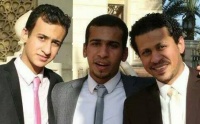Home » Egypt » Press Releases » EGY - News » Egypt: Repetitive Torture and Arbitrary Detention of 3 Brothers Including a Minor Sentenced to Life in Prison in Absentia
Arrest and first torture
On 14 April 2014, 28-year-old journalist Omer Ali Hassan Abdelmaksoud and his two brothers, 22-year-old swimmer Ibrahim and 17-year-old student Anas, were at their family's home in the industrial city of Mit Ghamr, 70km North of Cairo, when several civilian, police and security forces' cars stopped in front of the building. Their house was subsequently raided by members of the Homeland Security and of the General Investigations Department, without any search and arrest warrant shown to justify their intrusion. After confiscating computers, phones and cameras, they arrested Omer and Ibrahim before taking them for an unknown location.
Still under the shock, their relatives saw officers come back the next day to arrest Anas, who was brought to Mit Ghamr police department where Omer and Ibrahim had been detained over night. Subjected to multiple acts of torture, including beating, ripping their fingernails off, and kicking and eventually electrocution, the brothers were forced to confess to crimes, confessions which were later used by the public prosecution to charge them with "arson on cars from the presidential campaign of Al Sisi in Mit Ghamr," while Omer was additionally charged with "affiliation to a banned group".
The three brothers have constantly refuted the charges brought against them and stated that they had no affiliations whatsoever. Omer's employer, Misr Al Arabia, was also able to prove later that their employee was on duty in Cairo on the day of the alleged arson, a fact that was never taken into account. Following their indictment, they were moved to different detention centres before ending in Gamasa police station.
Incommunicado detention, trial in absentia and torture
Following requests from their lawyer, the Mansoura Criminal Court granted their demands for a release on bail twice but the prosecution appealed the decision on both occasions. Eventually, an appeals court rejected the appeal and ordered their release on 11 September 2014, which was formalised on paper two days later. The three young men, however, disappeared on the day of their expected release to reappear in detention on 22 September. They had in fact been kept in secret detention by the General Investigations Department and the prosecution brought new charges against them of "illegal demonstration in Mit Ghamr," in complete violation of the Court's orders.
Their detentions were subsequently renewed until they learned, on 19 January 2015, that Mansoura Criminal Court had sentenced them to life in prison in absentia for the charges of arson. Their lawyer was not even informed of the court's session and could not hear all the witnesses nor access their file, in complete violation of international fair trial rules, as enshrined in the International Covenant on Civil and Political Rights (ICCPR), binding upon Egypt by virtue of its ratification in 1982. They were then moved to Mit Salsil prison where Omer was tortured again. Beaten up with water pipes, stripped naked and forced to crawl on the ground, he decided to start a hunger strike to protest it, on 5 July. Guaranteed that it would never occur again and because he suffers from heart problems that have not been correctly treated since he was arrested, he ended it a few days later.
Second trial and new torture
In the meantime, Ibrahim and him had been sentenced to two years in prison on charges of "illegal demonstration", but the Mansoura appeals court overturned the ruling on 16 May 2015. While the two brothers were moved back to Gamasa police station, Anas was him transferred to a Juvenile Centre in Dikirnis and their retrial in the arson case started − the next hearing being scheduled for 19 October 2015. On 6 September 2015, as Ibrahim and Omer were being brought to court for a hearing, they ended-up in Mit Ghamr police station and were tortured to the point that the latter fainted. Informed, the Journalists' Union filed a complaint on their behalf to ask for investigations but the public prosecution has so far failed to take action. The three men remain arbitrarily detained to date, with few contacts with their family who can only see them during hearings because prison visits are not adapted, unsafe and too short.
In light of these elements and with an aim to end their detention, Alkarama sent a communication to the United Nations Working Group on Arbitrary Detention (WGAD) so that it recognises the arbitrary character of Omer, Ibrahim and Anas Ali Hassan Abdelmaksoud's detentions and to ask the Egyptian authorities to release them immediately and grant them a fair compensation for their time in detention. Additionally, the authorities should also launch impartial, prompt and thorough investigations into the acts of torture the three brothers reported having been subjected to and punish the authors accordingly. The Egyptian authorities should guarantee that every person who is arrested and detained is granted his right to challenge the lawfulness of his detention and applied all international fair trial rules, is free from torture and ill-treatment and detained in good and adapted conditions.
For more information or an interview, please contact the media team at This email address is being protected from spambots. You need JavaScript enabled to view it. (Dir: +41 22 734 1008).
 Algeria
Algeria Bahrain
Bahrain Djibouti
Djibouti Egypt
Egypt Iraq
Iraq Palestine/Israel
Palestine/Israel Jordan
Jordan Kuwait
Kuwait Lebanon
Lebanon Libya
Libya Mauritania
Mauritania Morocco
Morocco Oman
Oman Qatar
Qatar Saudi Arabia
Saudi Arabia Sudan
Sudan Syria
Syria Tunisia
Tunisia United Arab Emirates
United Arab Emirates Yemen
Yemen Other Countries
Other Countries


